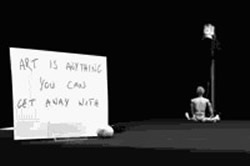 Who
am I? or, The Hidden Properties of Objects
Who
am I? or, The Hidden Properties of Objects
By Caridad Svich
My Arm
By Tim Crouch
59E59 Theaters
59 E. 59th St.
Box office: (212) 279-4200
Tim Crouch is a British actor, writer and
educator whose work explores the borders between education and
visual art. He co-founded Public Parts Theatre and devised eight
productions there with Julia Collins, including an adaptation
of Ford Madox Ford's The Good Soldier. His play for young
audiences Shopping for Shoes was commissioned by the
Royal National Theatre's Education Department. My Arm,
a solo show and his first adult play, is an extraordinary demonstration
of the theatrical power of inanimate objects. It is currently
running at 59 East 59th Street as part of the "Brits Off Broadway
2004" series.
Originally presented at the Edinburgh Festival
Fringe in 2003 at the Traverse Theatre (with previous preview
showings at the Hayward Gallery, the ICA and BAC in Britain, and
at the Zipper Theatre in New York), this play is a welcome antidote
to the brash, overproduced fare on so many U.S. stages. The story
My Arm tells is deceptively simple: at age ten, a boy decides
to live with one arm above his head for the rest of his life.
His adult self reflects upon the effect this willful and rather
pointless act has had on him and those around him over the subsequent
thirty years. Abetted by film sequences commissioned from British
artist Christian Dorley-Brown, and inanimate objects supplied
by the audience at the start of the show, Crouch tells a 60-minute
story of defiance, difference, vapidity, and essential loneliness.
Examining how modern art absorbs and consumes
the individual, My Arm is a delightful and moving fictionalized
confession. Fabricating the story of the stubborn boy who grows
up to be used by the contemporary art world and its voguish obsession
with "freakishness" and celebrity, Crouch shows us that this strange,
sad boy is ultimately redeemed by art and not crucified by it.
Spinning his tale with wit, whimsy, and deliberate playfulness,
Crouch captivates his audience--as writer and performer--with
his directness and seemingly improvisational style.
Similar in effect to the work of the London-based
company Improbable Theatre, whose The Hanging Man played
at BAM this season, and whose 70 Hill Lane was also in
part a confessional piece, My Arm invites the audience
to share a casual, communal experience. The body here is both
witness and witnessed, as the young self seen as an action doll
figure lives the story told by the adult human actor who manipulates
it. The rebellious futility of the young boy's initial act --
a rebellion against suburban conformity and homogeneity -- is
seen as the necessary un-necessary mark, or social marking, of
an artist. But lest the story seem too high-minded, Crouch anchors
it in the multiple reactions to the boy's act by his family, pet,
psychiatrists, and the doyennes of a vampirish art world (all
played by objects the audience has given him).
Animating these everyday objects, Crouch
finds expression in the expressionless and gives meaning to the
material things that carry so much of our emotional investment,
whether we realize it or not. Not unlike Todd Haynes's early film
Superstar: The Karen Carpenter Story, which was through-animated
with Barbie dolls, My Arm asks us to recognize as an
audience how the life of a play, and thus of a story, is often
contained in the silent objects that inhabit its world. By asking
his audience to empty their pockets and purses, and offer up,
as it were, the cast for the evening's performance, Crouch also
asks us to examine the stories our pockets contain. By becoming
lost artifacts in Crouch's ambling story of loss and redemption,
our daily, seemingly insignificant objects are given new emotive
meaning, and in a rather spry way Crouch also asks us to reflect
upon the meaning we impart to our daily casual interactions with
others.
Using silence with rare eloquence, Crouch's
evocative study of the uses and abuses of the self for the sake
of art, and of how one boy is educated to his own nature, touches
raw nerves in its audiences. The iconic objects meet the odd,
iconic story head-on and with disarming grace. Crouch lets us
be inside and outside the story at the same time. His storyteller's
ability to keep us engaged, surprised, and even at times drifting
along with him is delightful. Keeping himself, the presentation
of the work, and the material honest, despite the fact that it's
obviously a hyperbolic fiction, he reminds us of the beauty, elegance
and simplicity of a well-told theatrical tale. My Arm
is cousin to Doug Wright's I Am My Own Wife. It shares
with Wright's play a delicate and distinct obsession with the
spirit world of material things, and with the question of how
one can make art out of one's life, unwittingly or not. Disguised
as a tall tale told small, My Arm is a quietly small
tale told with a big heart. It has a refreshing lack of sentimentality
but is braced with the tempered acknowledgment of sentiment: the
power of feeling, and the importance of human connection. Embracing
"fakery," Crouch forges a stage self worthy of our anguish, laughter,
and concern. He already plans a follow-up, teasingly titled An
Oak Tree, 1973.
